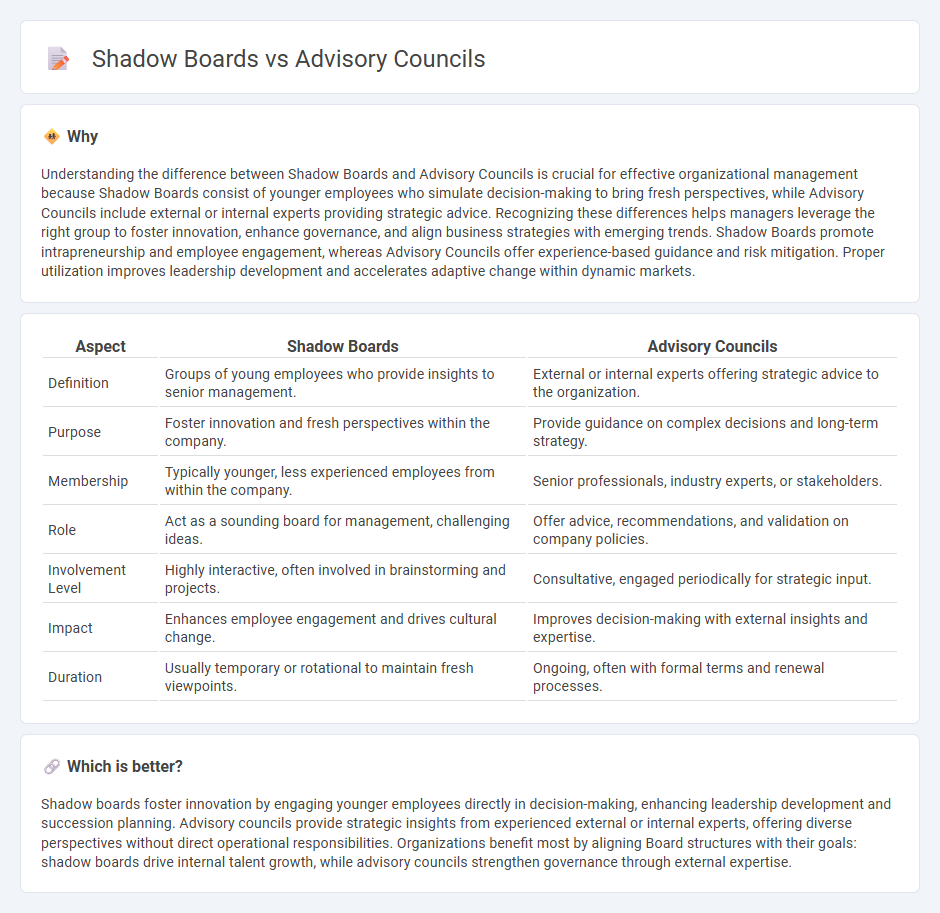
Shadow boards consist of younger employees who provide fresh perspectives and innovative ideas directly to senior management, fostering diversity and agility in decision-making. Advisory councils are typically composed of external experts or stakeholders who offer strategic guidance and industry insights to enhance organizational governance. Explore the unique benefits and differences between shadow boards and advisory councils to optimize your management approach.
Why it is important
Understanding the difference between Shadow Boards and Advisory Councils is crucial for effective organizational management because Shadow Boards consist of younger employees who simulate decision-making to bring fresh perspectives, while Advisory Councils include external or internal experts providing strategic advice. Recognizing these differences helps managers leverage the right group to foster innovation, enhance governance, and align business strategies with emerging trends. Shadow Boards promote intrapreneurship and employee engagement, whereas Advisory Councils offer experience-based guidance and risk mitigation. Proper utilization improves leadership development and accelerates adaptive change within dynamic markets.
Comparison Table
| Aspect | Shadow Boards | Advisory Councils |
|---|---|---|
| Definition | Groups of young employees who provide insights to senior management. | External or internal experts offering strategic advice to the organization. |
| Purpose | Foster innovation and fresh perspectives within the company. | Provide guidance on complex decisions and long-term strategy. |
| Membership | Typically younger, less experienced employees from within the company. | Senior professionals, industry experts, or stakeholders. |
| Role | Act as a sounding board for management, challenging ideas. | Offer advice, recommendations, and validation on company policies. |
| Involvement Level | Highly interactive, often involved in brainstorming and projects. | Consultative, engaged periodically for strategic input. |
| Impact | Enhances employee engagement and drives cultural change. | Improves decision-making with external insights and expertise. |
| Duration | Usually temporary or rotational to maintain fresh viewpoints. | Ongoing, often with formal terms and renewal processes. |
Which is better?
Shadow boards foster innovation by engaging younger employees directly in decision-making, enhancing leadership development and succession planning. Advisory councils provide strategic insights from experienced external or internal experts, offering diverse perspectives without direct operational responsibilities. Organizations benefit most by aligning Board structures with their goals: shadow boards drive internal talent growth, while advisory councils strengthen governance through external expertise.
Connection
Shadow boards and advisory councils both serve as strategic tools to enhance organizational decision-making by providing diverse perspectives and fostering innovation. Shadow boards typically consist of younger employees who mirror the senior leadership team to offer fresh insights and develop future leaders, while advisory councils comprise external or internal experts who provide specialized guidance on specific challenges. Together, they strengthen governance by integrating varied viewpoints and promoting collaborative management practices.
Key Terms
Decision-making authority
Advisory councils provide expert guidance without formal decision-making authority, serving as consultative bodies that influence leadership through recommendations. Shadow boards consist of future leaders or younger employees who actively engage in strategic decisions, often holding collaborative decision-making roles alongside executive teams. Explore how each structure impacts organizational governance and innovation by learning more about their unique decision-making dynamics.
Stakeholder representation
Advisory councils enhance stakeholder representation by providing diverse external perspectives that guide strategic decisions and foster transparency. Shadow boards empower future leaders within an organization to simulate executive roles, promoting internal stakeholder development and readiness. Explore the distinct benefits of advisory councils and shadow boards to optimize your stakeholder engagement strategy.
Generational insight
Advisory councils often provide strategic guidance by integrating diverse generational perspectives, enabling organizations to anticipate market trends and customer preferences effectively. Shadow boards consist of younger employees who collaborate closely with senior leadership to offer real-time insights on innovation and workplace culture, bridging the generational gap within decision-making processes. Discover how leveraging generational insight through advisory councils and shadow boards can transform your organizational strategy.
Source and External Links
What is an Advisory Council? (Overview, Roles, and ... - An advisory council is a group of experts or industry professionals who provide specialized knowledge and strategic advice to a board of directors, serving in a non-binding, consultative role to help organizations navigate complex challenges--especially in areas where board members lack deep expertise.
CTE Advisory Councils Manual - Advisory councils in career and technical education (CTE) programs bring together diverse stakeholders to advise on curriculum, program changes, and industry alignment, with school administrators coordinating their activities, arranging meetings, and recognizing member contributions while maintaining clear communication channels.
CREATING PATIENT AND FAMILY ADVISORY COUNCILS - Patient and family advisory councils serve as resources for healthcare organizations by facilitating communication between patients, families, and staff, providing input on policy and program development, and actively collaborating to improve quality, safety, and the care experience.
 dowidth.com
dowidth.com